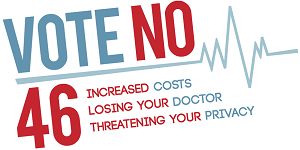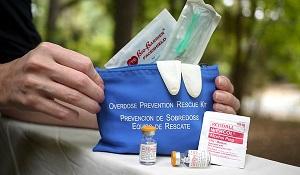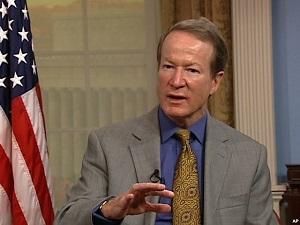A California initiative to raise medical malpractice liability limits is using the focus group-friendly drug testing of doctors as a sweetener, but even that may not be enough to save Proposition 46 as the medical community (and drug reformers) unite against it.
The Center for Addiction and Mental Health in Toronto has issued a report calling for marijuana legalization with strict regulation.
A major report on CBD cannabis oil products come out, San Diego may soon get its first legal dispensary (it's only been 18 years!), patients in the Northeast grumble, the Illinois program gets lots of applicants, and more.
A pill-popping, prescription-forging North Carolina narc, a pair of lying New York City narcs, a crack-slinging Baltimore schools police officer, and a pot-growing California prison guard are among the corrupt cops in the news this week.
Polls continue to split on the Alaska initiative, Illinoisans are lining up for medical marijuana, four Northeastern states unite to fight heroin, Canada's largest addiction center calls for marijuana legalization, and more.
The legalization initiatives in DC and Oregon pick up endorsements, Colorado legal marijuana sales keep on increasing, a Vermont poll has a plurality for legalization, drug use among pregnant women is in the news, Mexico busts another cartel leader, and more.
Missouri marijuana activists are keeping things hopping, Connecticut patients want actual buds, the Washington Post continues its asset forfeiture series, the Labor Department issues proposed rules for unemployment compensation drug testing, and more.
The State Department's point man on international drug affairs signals a new flexibility in US policy, Bolivia's coca farmer President Evo Morales wins reelection, the DC initiative wins more endorsements, the Florida medical marijuana initiative is in danger, and more.
A report on decriminalization in California has good news, state-level marijuana legalization could be an impetus for the US to modify international drug treaties, pain pill deaths are down (but heroin deaths are up), New Zealand has a different take on employee drug testing, and more.
In California, an initiative designed to increase the caps on medical malpractice awards is catching the attention not only of powerful legal and medical interests, but also drug reformers. That's because, in what opponents call a cynical ploy, the malpractice initiative leads with a provision to impose drug testing on doctors.

Prop 46 would require the suspicionless drug testing of doctors. (wikimedia.org)
, whose controversial ballot title is "Drug and Alcohol Testing of Doctors, Medical Negligence Lawsuits. Initiative Statute," would, if passed, make California the first state in the nation to impose drug testing on doctors. According to a
Ballotpedia summary, it would:
- Increase the state's cap on non-economic damages that can be assessed in medical negligence lawsuits to over $1 million, from the current cap of $250,000.
- Require drug and alcohol testing of doctors and reporting of positive tests to the California Medical Board.
- Require the California Medical Board to suspend doctors pending investigation of positive tests and take disciplinary action if the doctor was found impaired while on duty.
- Require health care practitioners to report any doctor suspected of drug or alcohol impairment or medical negligence.
- Require health care practitioners to consult the state prescription drug history database before prescribing certain controlled substances.
The fight over Prop 46 is shaping up to be the most expensive initiative campaign ever, with rival groups having already raised nearly $70 million. The vast majority of that funding is coming from opponents of the initiative, primarily the very well-heeled state medical community. The No on 46 campaign committee alone has raised nearly $57 million to kill it.
The stakes are huge. Portrayed by supporters -- mainly trial lawyers -- as a boon to patients harmed by medical misconduct and hamstrung by state laws limiting malpractice awards, state analysts estimate that it could cost state health care programs "tens of millions to several hundred million dollars annually," while a legion of hospitals, health clinics, medical practices, and other health care professionals warn that Prop 46 would drive up health care costs across the board while primarily benefiting the bottom line of malpractice lawyers.
Law firms and attorneys' groups are the biggest backers of Prop 46, but they aren't the only ones. The advocacy group Consumer Watchdog is also backing it to the tune of more than $2 million, and has laid out some arguments in favor of it.
"According to a study published in the Journal of Patient Safety, medical negligence is the third leading cause of death in the country behind only heart disease and cancer. As many as 440,000 people die each year from preventable medical negligence. That's like a 747 crashing every 10 hours," the group said in a March flyer. "The California Medical Board estimates that almost one-in-five doctors (18%) suffer from drug and/or alcohol abuse at some point during their careers -- and leading medical safety experts have called for random drug testing to curb substance abuse and ensure patient safety."
In that same flyer, Consumer Watchdog also warned that "doctors are the biggest suppliers for chronic prescription drug abusers" and that "drug prescribed by doctors caused or contributed to nearly half of recent prescription drug overdose deaths in California." But such scary claims beg the question of who else would be expected to supply prescription drugs.
While lawyers and some consumer advocates are lining up to support Prop 46, it is also generating
a huge and powerful group of opponents, including hundreds of medical groups, health care providers, hospitals, insurance companies, and clinics and private practices worried about rising malpractice insurance costs. It is also opposed by dozens of county medical associations, the state Chamber of Commerce and many local affiliates, along with more than a dozen labor unions.
The strange bedfellow opposition extends even further, with the state Republican Party, the state American Civil Liberties Union (and its local affiliates), and the California NAACP all among groups coming out against Prop 46. Also among its foes are most of the major newspapers in the state, which have thoroughly condemned it.
"If doctors are drug-addled, other doctors and nurses have a duty to report them," the Sacramento Bee editorialized. "If doctors make horrible mistakes during surgery, there might be cause for testing. But Proposition 46 would impose the insulting requirement of random testing on all doctors who have hospital privileges, and require that the Medical Board of California discipline any doctors whose tests are dirty. In its propaganda, Consumer Watchdog jokes about privacy concerns in a lowest-common-denominator video showing that other professionals must provide urine samples. Simply because laws allow for testing of some workers doesn't mean physicians' privacy should be trampled."
The conservative San Diego Tribune was similarly irked by the use of doctor drug testing as a come-on designed to induce voters to favor the initiative, calling it "a pathetic scam" in the title of its editorial.
"Plainly, the doctor drug-testing provision is 'the ultimate sweetener' designed to make this foul brew go down better. It wasn't a critic who used that term," the newspaper noted. "It was Jamie Court, president of Consumer Watchdog, in an interview with The Los Angeles Times. Such an openly cynical attempt to manipulate voters shouldn't be rewarded. Vote no on Proposition 46."
The drug testing provision has also provoked opposition from the state's largest marijuana consumer organization, CA NORML, and the Drug Policy Forum of California, which urged supporters to vote no on Prop 46 in its 2014 Election Guide.

Anti-Prop 46 campaign poster (caphq.org)
"Drug testing is about marijuana," explained CA NORML head Dale Gieringer. "More than half the drug test positives out there are marijuana. This initiative deceitfully claims to be about alcohol and prescription drug abuse by doctors, but drug testing is almost useless with alcohol -- unless you're actually drunk at the time, I suppose -- and if you closely read the text of the initiative, you see that prescription drugs are perfectly excusable as long as the doctor has a prescription. So, there's a medical excuse for the prescription drugs mentioned in the ads, but not for medical marijuana, since the initiative only allows exemptions for prescribed controlled substances."
The drug testing regime proposed by the initiative is antiquated, too, Gieringer said.
"This thing is using urinalysis drug testing standards promulgated by the feds a generation ago," he pointed out. "The list of illegal drugs includes PCP -- yeah, that's a major problem, all those docs on PCP -- but doesn't include the new synthetics. And the list specifically includes marijuana metabolites, but not THC. That's because they're relying on urinalysis, which can't detect active THC, so only the inactive metabolite is being considered under this insidious proposition."
In other words, the drug tests wouldn't catch doctors with alcohol problems unless they were literally drinking on the job, would excuse the presence of prescription drugs if the doctor had a prescription, and wouldn't find doctors who were actually high on pot, but would find those who had used the substance days or weeks earlier. But it sounded good in focus groups.
"As we know, the drug testing provision was an afterthought," Gieringer said. "This is being done by trial lawyers, and the basic purpose is to heighten the limits on malpractice liability. But those focus groups showed everybody liked the idea of drug testing doctors."
The drug testing provision may indeed have been a sweetener designed to improve Prop 46's chances at the polls next month. But the well-funded and broad-based opposition campaign is taking its toll.
Although it polled well in a June Field poll, coming in with 58% support, support has declined since then. An August Field poll saw support plummet, with only 34% in favor, 37% opposed, and 29% undecided. But it isn't over until it's over. The number of undecideds less than a month out is big enough to swing the results either way.
The airwaves across California are already filled with Prop 46 campaign ads. We can only expect them to increase in the next few weeks as the deep-pocketed contenders throw everything they've got at the voters in the final days of campaigning.
back to top
In a report issued today, Canada's largest addiction center called for marijuana legalization with a strict regulatory approach. The recommendation is based in harm reduction principles.
The
Center for Addiction and Mental Health (
CAMH) in Toronto made the call for legalization in its report
Cannabis Policy Framework. It comes after an in-depth analysis of the health, social, and legal implications of marijuana use, as well as an examination of comparative marijuana policy, by
CAMH scientists and policy experts.
"Canada's current system of cannabis control is failing to prevent or reduce the harms associated with cannabis use," said Dr. Jürgen Rehm, Director of the Social and Epidemiological Research Department at CAMH. "Based on a thorough review of the evidence, we believe that legalization combined with strict regulation of cannabis is the most effective means of reducing the harms associated with its use."
The report found that 40% of Canadians have used marijuana at least once and 10% have used it in the past year. Among people aged 15 to 24 that figure jumps to 20%.
CAMH does not view marijuana as a benign substance and thus calls for a very strong regulatory approach.
"Cannabis use is associated with a variety of health harms like problems with cognitive and psychomotor functioning, respiratory issues, cannabis dependence and mental illness," Rehm said. "For this reason, any reform of Canada's system of cannabis control must include a strong focus on prevention and a range of interventions aimed at groups that are at higher risk of harm, including youth and people with a personal or family history of mental illness."
But CAMH also clearly recognizes the harm derived from marijuana prohibition. The group noted that criminalization doesn't deter use, but does drive users away from prevention, risk reduction, and treatment services, as well as exposing them to non-quality controlled substances.
CAMH is calling for a government monopoly on sales, as well as other restrictions.
"Legalization of cannabis must be governed by strict regulations that ensure it is not sold like other commodities," Rehm said. "This would include a government monopoly on sales, limits on availability, a pricing system that discourages use of higher-harm products, and a ban on marketing."
Canada's governing Conservatives have proven extremely averse to marijuana law reform and have, in fact, moved in the opposite direction through measures such as instituting mandatory minimum sentencing for some marijuana cultivation offenses. The leader of the opposition Liberal Party, Justin Trudeau, on the other hand, is calling for marijuana legalization. National elections are set for next year.
"We've known for a long time that the existing approach to cannabis policy is not working," said Dr. Rehm. "We want this framework to add to an informed discussion about the future of cannabis policy and to serve as a guide to the factors that need to be considered in order to come to a solution that is the most beneficial for public health. We believe that the best solution is a system of legalization combined with strict regulation of cannabis."
back to top
A major report on CBD cannabis oil products come out, San Diego may soon get its first legal dispensary (it's only been 18 years!), patients in the Northeast grumble, the Illinois program gets lots of applicants, and more. Let's get to it:
NationalOn Monday, Project CBD released a report on CBD cannabis oil products that raises a number of questions about the safety, reliability, and legality of mass-marketed CBD oil products, some of which are available in Internet marketplaces. The report found that some products contained toxic solvents, some had little actual CBD in them, and some entities that claimed to obtain CBD from industrial hemp crops in other countries were probably not telling the truth. Click on the link to go directly to the report.
California
On Tuesday, a federal court judge issued a preliminary injunction barring Lake County officials from using warrantless raids to seize and destroy medical marijuana plants. Patients have sued to block the enforcement measures linked to Measure N, an ordinance that severely restricts medical marijuana grows in the county. Judge Thelton Henderson ruled that the patients have demonstrated a strong likelihood of prevailing at trial on their claim that the raids violate their Fourth Amendment rights.
On Wednesday, what would be San Diego's first legal dispensary won a key approval. A Green Alternative has applied to open its doors in Otay Mesa and won approval from a city hearing officer for its plans. Unless someone appeals the decision, the shop should be open by year's end.
Connecticut
On Monday, Connecticut patients demanded whole buds, not ground-up whole plant material. State medical marijuana regulations require that the plant be ground up, and that's not sitting well with some patients and activists. Homogenizing the plant results in "the degradation of the cannabinoids, the actual essential oils that are in the flower," explained Peter Mould, executive director of Connecticut NORML, who has posted a petition at change.org (search for "medical marijuana CT") asking state regulators to allow the sale of whole buds.
Florida
On Tuesday, another poll had the medical marijuana initiative coming up just short. A new poll with a large sample and small margin of error has Amendment 2 coming up short. According to the SaintPetersBlog poll, a slim majority (52%) supports the initiative, but that's not enough because, as a constitutional amendment, it needs 60% of the vote to pass. The poll sample consisted of 3,128 Florida registered voters who said they were planning to vote in the election and has a margin of error of +/- 1.8%. The poll is roughly in line with other recent surveys that have shown Amendment 2 polling in the 50s.
Guam
Last Wednesday, the Guam Election Commission moved to end legal challenges to the medical marijuana initiative vote. The commission has asked the US District Court on the island territory to dismiss the petition for a writ blocking the vote filed by local attorney Howard Trapp. Trapp has argued that the legislature cannot send an initiative to the voters, but the Election Commission and the Guam Supreme Court have already rejected his claim.
Illinois
Last Wednesday, more than 6,000 Illinoisans had applied for medical marijuana cards. The Department of Health reported that some 6,300 state residents have applied for permission to use medical marijuana, with cancer, fibromyalgia, multiple sclerosis, and spinal cord injuries being the most common health conditions mentioned. But the department also noted that the vast majority of applications were incomplete; only 800 have submitted complete applications, which include a doctor certification form and background check information. People whose applications are incomplete will be notified and then will have 21 days to complete them.
Massachusetts
On Tuesday, patients protested over the slow pace of medical marijuana implementation. Several dozen patients and advocates rallied outside the Department of Public Health in Boston Tuesday to call on the department and the governor to get the state's medical marijuana program moving. Voters legalized medical marijuana nearly two years ago, but: "We have zero cannabis plants in the ground to serve the patients," said Mickey Martin, a medical marijuana activist. "It's unacceptable to make patients wait." The protestors are calling for the state to immediately open up the program, get dispensaries up and running, and ease restrictions on "hardship cultivation" so more patients can grow their own.
back to top
A pill-popping, prescription-forging North Carolina narc, a pair of lying New York City narcs, a crack-slinging Baltimore schools police officer, and a pot-growing California prison guard are among the corrupt cops in the news this week. Let's get to it:
In Elizabethtown, Tennessee,
a Carter County sheriff's jail guard was fired September 28 after he was caught bringing drugs and contraband into the jail. The sheriff didn't announce the firing until last week. Officer Kenneth Turner has yet to be charged in the case, but the state Bureau of Investigation is looking into it.
In New York City, two former Yonkers narcotics officers were arrested last Wednesday for lying about drug activity in order to obtain search warrants. Former narcs Neil Vera and Christian Koch are accused of lying to a Yonkers City Court judge to convince him to sign a search warrant in a drug raid that resulted in a man's death. Dario Tena fell to his death from a window during the raid. The two former officers pleaded not guilty to one count of felony perjury.
In Sacramento, a California state prison guard was arrested last Wednesday when an investigation into gang activity resulted in the seizure of 617 marijuana plants. Guard Eddie Lay, 32, is charged with cultivation of marijuana for sale. Four others were also arrested, and police seized guns, 248 pounds of packaged pot, and more than $5,000 in cash in addition to the plants.
In Houston, a former Houston police officer pleaded guilty last Thursday to playing a role in a drug conspiracy. Marcos Carrion admitted to providing security for a drug deal involving 10 kilograms of cocaine in exchange for $2,500. He also admitted agreeing to provide security for future dope deals. He copped to one count of conspiracy to possess with the intent to distribute five or more kilos of cocaine and is looking at a mandatory minimum of 10 years in prison.
In Baltimore, a former Baltimore school police officer was sentenced last Friday to two years in federal prison for dealing in cocaine. Napoleon McLain, 31, had pleaded guilty to conspiracy to distribute and possess with intent to distribute cocaine base. He admitted buying various ounces of cocaine base and reselling them to others between December 2012 and August 2013.
In Wilmington, North Carolina, a former New Hanover County sheriff's narcotics lieutenant was sentenced Monday to seven years in state prison for stealing evidence and forging court orders to obtain prescription medications. Joseph Antoine LeBlanc, 42, had pleaded guilty to a hundred felony charges including four counts of embezzlement; four counts of obstruction of justice; four counts of altering, destroying or stealing criminal evidence; four counts of obtaining property by false pretense; 28 counts of uttering forged papers; 28 counts of forgery; and 28 counts of obtaining a controlled substance by misrepresentation, fraud, forgery, deception or subterfuge. Another 40 counts of trafficking opium or heroin and 21 counts of possession of a controlled substance were dismissed. LeBlanc admitted forging the names of local judges and assistant DAs to obtain the prescriptions.
back to top
Polls continue to split on the Alaska initiative, Illinoisans are lining up for medical marijuana, four Northeastern states unite to fight heroin, Canada's largest addiction center calls for marijuana legalization, and more. Let's get to it:

heroin (wikimedia.org)
Polls Split on Alaska Initiative. The fate of Alaska's Measure 2 legalization initiative remains up in the air. Polls this week commissioned by the opposing sides had differing results. A Dittman Research poll sponsored by the "Big Marijuana, Big Mistake, Vote No on 2" campaign has the measure losing 44% to 53%. But the Alaska Survey poll, in which the Campaign to Regulate Marijuana Like Alcohol paid for a marijuana policy question to be asked, had the initiative winning 57% to 39%. Both polls claimed a +/- 4% margin of error, but even so, both of them can't be right. The split in polls has been evident throughout the campaign. Stay tuned.
Medical Marijuana
More Than 6,000 Illinoisans Have Applied for Medical Marijuana Cards. The Department of Health reported Wednesday that some 6,300 state residents have applied for permission to use medical marijuana, with cancer, fibromyalgia, multiple sclerosis, and spinal cord injuries being the most common health conditions mentioned. But the department also noted that the vast majority of applications were incomplete; only 800 have submitted complete applications, which include a doctor certification form and background check information. People whose applications are incomplete will be notified and then will have 21 days to complete them.
Guam Election Commission Seeks to End Legal Challenge to Medical Marijuana Initiative Vote. The commission has asked the US District Court on the island territory to dismiss the petition for a writ blocking the vote filed by local attorney Howard Trapp. Trapp has argued that the legislature cannot send an initiative to the voters, but the Election Commission and the Guam Supreme Court have already rejected his claim.
Drug Policy
Drug Czar Claims Marijuana Legalization Undermines Fight Against Opiates. In a speech yesterday in Maine, acting head of the Office of National Drug Control Policy (ONDCP -- the drug czar's office) Michael Botticelli argued that the trend toward marijuana legalization is making the fight against more serious drug problems, such as the abuse of prescription opioids, more difficult. He said that early use of marijuana increases the likelihood that users will develop dependency on other drugs. "It's hard to say at one level that we want to think about prescription drug abuse and heroin abuse without looking at how to prevent kids from starting to use other substances from an early age," he said.
Heroin
Four Northeastern States Create Anti-Heroin Task Force. Massachusetts, New Jersey, New York, and Pennsylvania officials Wednesday announced the formation of the Northeast and Mid-Atlantic Heroin Task Force (NEMA-HTF) in "an unprecedented law-enforcement collaboration to combat the growing problem of heroin distribution and abuse in communities throughout the region." Attorneys General from the four states will work together to try to repress the heroin trade. "For too long, drug organizations have tried to outmaneuver law-enforcement agencies by crossing state lines. This task force will ensure that our borders do not become our boundaries," said New York Attorney General Eric Schneiderman. "By joining together, we can prevent defendants from using state borders as a shield from law-enforcement and allow us to shut down the pipelines and cut off the heroin supply."
Why Are We Freaking Out About Heroin? Wonkblog Asks. The Washington Post's Wonkblog has an insightful piece about the level of heroin use in the country and the public policy response it has engendered. The piece notes that "hardly anyone uses heroin" and is full of crunchy numbers and thoughtful commentary. "Overall, it's important for the public -- and particularly the media -- to keep some perspective when it comes to the numbers on heroin," the piece concludes. "It doesn't make a lot of sense to speak of 'epidemics' when use rates continue to hover somewhere between 0.1 and 0.5% of the total population. And kneejerk legislating will only make the problem worse." Click on the link for the full piece.
Psychedelics
New York City Conference on Psychedelics This Weekend. The eighth annual Horizons: Perspectives on Psychedelics conference will be held at Judson Memorial Church and The New School in Greenwich Village on October 11 and 12. Horizons focuses on contemporary research into the applications of psychedelics, providing an invaluable forum for experts to share ideas, insights, and to rethink the future of these drugs in science, medicine, culture, and history. This year, professors, researchers, writers and practitioners from the United States, England and Switzerland will be presenting findings and insights in the fields of neuroscience, terminal anxiety disorder, depression, hard drugs addiction, sexual orientation and identity, and more. Click on the links for more information.
International
Canada's Largest Addiction Center Calls for Marijuana Legalization. In a report issued today, Canada's largest addiction center calls for marijuana legalization with a strict regulatory approach. The recommendation is based in harm reduction principles. The Center for Addiction and Mental Health (CAMH) in Toronto made the call for legalization in its report CAMH's Cannabis Policy Framework. It comes after an in-depth analysis of the health, social, and legal implications of marijuana use, as well as an examination of comparative marijuana policy, by CAMH scientists and policy experts. "Canada's current system of cannabis control is failing to prevent or reduce the harms associated with cannabis use," said Dr. Jürgen Rehm, Director of the Social and Epidemiological Research Department at CAMH. "Based on a thorough review of the evidence, we believe that legalization combined with strict regulation of cannabis is the most effective means of reducing the harms associated with its use."
Myanmar Moving Toward Reducing Drug Penalties. Deputy Minister for Home Affairs Brigadier General Kyaw Kyaw Tun has told members of parliament that the government is preparing to review sentences for drug use, which currently range from five to 15 years in prison. "Officials from the Central Committee for Drug Abuse Control, the Union Attorney-General's Office and the Union Supreme Court are drawing up an amendment law," the deputy minister said. The Myanmar government has been moving to shift drug penalties since 2012.
back to top
The legalization initiatives in DC and Oregon pick up endorsements, Colorado legal marijuana sales keep on increasing, a Vermont poll has a plurality for legalization, drug use among pregnant women is in the news, Mexico busts another cartel leader, and more. Let's get to it:

Gary Johnson's Our America Initiative endorses the DC legalization initiative. (ouramericainitiative.com)
Gary Johnson Group Endorses DC Legalization Initiative. The Our America Initiative, a non-partisan group headed by former Republican New Mexico and Libertarian presidential candidate Gary Johnson, has endorsed the Measure 71 marijuana possession and cultivation legalization initiative. The Our America Initiative includes ending marijuana prohibition in its list of national projects, along with ending warrantless NSA spying, abolishing the IRS, and requiring presidential debates to include all viable candidates.
Oregon Social Workers Endorse Legalization Initiative. The Oregon chapter of the National Association of Social Workers (NASW) has endorsed the Measure 91 legalization initiative. "We conclude that the measure's approach to marijuana use as a public health issue is more consistent with the social work profession's mandate, than Oregon's current treatment of non-medical marijuana use," the group said in a statement. Click on the title link for more.
Vermont Poll Finds Narrow Plurality of Voters Favoring Legalization. A WCAX TV poll found that 49% of respondents support marijuana legalization, with 43% opposed. The issue has polled better in previous polls, but those were polls of the general population -- not voters. Support is strongest among youthful respondents at 59%, but that is the age group least likely to vote.
Colorado Legal Marijuana Sales Up 10% in August. The state Department of Revenue reported Thursday that marijuana retailers sold $33 million in recreational weed last month, up 10% over the previous month. So far this year, marijuana sales (recreational and medical) have generated $45.2 in tax revenues.
Drug Testing
Ohio Bill Would Make College Athletes Take Mandatory Drug Tests. A bill filed Wednesday, House Bill 633, would make Ohio the first state in the nation to require mandatory, suspicionless drug testing of student athletes at public colleges and universities. The bill would require all athletes to be drug tested during an annual physical and before any championship games. Colleges and universities would also have to adopt policies to punish athletes caught using substances banned by the NCAA, including marijuana, but not alcohol. Rep. Peter Beck (R-Macon) said he doesn't believe there is a drug problem among college athletes, but he wants any using drugs to be found and placed in drug treatment. The state legislative session ends in December.
Pregnancy
Call for Justice Department to Renounce the Criminalization of Pregnancy. Some 48 reproductive justice, drug reform, women's rights, and civil liberties groups led by National Advocates for Pregnant Women have sent a letter to the Justice Department calling on Attorney General Holder to move away from policies that enhance criminal sentences for crimes committed while pregnant. The letter was inspired by the case of Tennessee woman Lucy Weld, who pleaded guilty to conspiracy to manufacture meth and was hit with an additional six years in prison because she was pregnant when she committed the offense. The federal prosecutor in the case, US Attorney William Killian, used the case to "send a message" that he would seek sentencing enhancements in similar cases.
Growing Calls for Drug Testing of Pregnant Women. Faced with a growing number of infants born exposed to drugs while still in the womb, medical and other groups are increasingly calling for universal drug screening and/or drug testing of pregnant women. The American Congress of Obstetricians and Gynecologists and the Association of State and Territorial Health Officials are calling for verbal drug screening followed by a drug test if necessary and agreed upon. The American Medical Association also endorses universal screening. But pregnant rights advocates argue that screening for drug use is more likely to lead to punishment or loss of custody rather than drug treatment. "Instead, what we see over and over again is that screening is used as a tool for reporting mothers to child welfare services and police enforcement," said Kylee Sunderlin of National Advocates for Pregnant Women. "So even if the screening is universal, the reporting is not, which means that low-income women and women of color will continue to be vastly over-represented in punitive child welfare interventions and, in some states, arrests." Click the link for more details.
International
Mexico Nabs Another Cartel Capo. Mexican federal police Thursday arrested Vicente Carrillo Fuentes, reputed head of the Juarez cartel, in a "routine traffic stop" in Torreon. Carillo Fuentes is the brother of Amado Carillo Fuentes, who picked up the sobriquet "Lord of the Skies" for using jet liners to fly drug loads from South America to Mexico before his death in a botched cosmetic surgery operation in 1997. Vicente Carillo Fuentes is just the latest cartel leader busted or killed during the Pena Nieto presidency. Hector Beltran Leyva was captured just last week; Sinaloa cartel head Joaquin "El Chapo" Guzman was captured in February, Zetas leader Miguel Angel Trevino was captured in July 2013, and Gulf cartel head Jorge Eduardo Costilla was caught in September 2012.
back to top
Missouri marijuana activists are keeping things hopping, Connecticut patients want actual buds, the Washington Post continues its asset forfeiture series, the Labor Department issues proposed rules for unemployment compensation drug testing, and more.

The opioid overdose reversal drug naloxone is coming to Michigan. (harmreduction.org)
Show-Me Cannabis Activist Sues Missouri Narcs for Violating Sunshine Law. Aaron Malin, a member of the Missouri marijuana reform group Show-Me Cannabis, has filed suit against the Missouri Narcotics Officers Association for failing to hand over documents and information about budgets and training the group provides to narcotics officers. The lawsuit could clarify the question of whether the association is subject to the state's Sunshine Law. Malin argues that because much of the group's funding comes from dues and training paid for by members of taxpayer-funded drug task forces, it is a quasi-governmental entity and therefore subject to the law.
Columbia, Maryland, Cultivation Decriminalization Advances. The city's Disabilities Commission voted unanimously last week to endorse an ordinance that would decriminalize the cultivation of up to two marijuana plants. People caught growing two plants would face only a $250 fine; seriously ill people would face no fine. The city council had asked various commissions to weigh in; the Board of Health and the Substance Abuse Advisory Commission came down against the proposal. The council will take it up at a meeting next Monday.
Medical Marijuana
Connecticut Patients Want Whole Buds, Not Ground-Up Whole Plant. State medical marijuana regulations require that the plant be ground up, and that's not sitting well with some patients and activists. Homogenizing the plant results in "the degradation of the cannabinoids, the actual essential oils that are in the flower," explained Peter Mould, executive director of Connecticut NORML, who has posted a petition at change.org (search for "medical marijuana CT") asking state regulators to allow the sale of whole buds.
Asset Forfeiture
Seized Cash Fuels Law Enforcement Spending. The Washington Post continues to hammer away at asset forfeiture. This latest in an ongoing series of articles examines what law enforcement agencies are buying with the hundreds of millions of dollars they have seized under federal asset forfeiture laws. The Post examined 43,000 annual reports from police agencies under the Justice Department's Equitable Sharing program. While some of the spending is justifiable, the Post also found seized funds paying for luxury vehicles, travel expenses, and even a clown named Sparkles. It's a long, but worthwhile read.
Drug Testing
Labor Department Issues Proposed Rule for Unemployment Compensation Drug Testing; Limits It to Job Categories Where Drug Testing is Required. The department is responding to the Middle Class Tax Relief and Job Creation Act of 2012, which has a provision allowing states to drug test people seeking unemployment compensation. "We propose that an applicant may be drug tested by the State in order to be eligible to receive State UC if the applicant's only suitable work, as defined under the State UC law, is in a position or class of positions, i.e., an 'occupation,' for which Federal law or that State's law requires employee drug testing in that occupation," the department proposed.
Harm Reduction
Michigan Governor Signs Overdose Prevention Law. Gov. Rick Snyder (R) today signed into law a bill that requires emergency medical responders to be trained to administer the opioid overdose reversal drug naloxone (Narcan). The legislation, House Bill 5407, is part of a package of bills dealing with the issue. Snyder signed them all.
Pregnancy
Two More Alabama Counties Start Charging Pregnant Women Who Test Positive for Illegal Drugs. Calhoun and Cleburne counties now join Etowah County in seeking to prosecute pregnant women who use drugs, saying the move is designed to deter them from using drugs. That's even though there is a strong consensus among the medical community that criminalizing pregnant women hooked on drugs is not good for either mother or child, because the threat of arrest may deter pregnant women from seeking adequate prenatal health care.
International
Medical Marijuana Momentum in Australia. The government of the Australian Capital Territory (ACT) announced today that it will join in a national clinical trial on medical marijuana. It will join in trials being conducted by the New South Wales government. Nearly two-thirds of Australians support medical marijuana, according to a July poll, and both the national and various state governments are becoming more receptive.
back to top
The State Department's point man on international drug affairs signals a new flexibility in US policy, Bolivia's coca farmer President Evo Morales wins reelection, the DC initiative wins more endorsements, the Florida medical marijuana initiative is in danger, and more.

Assistant Secretary of State for International Narcotics and Law Enforcement William Brownfield says some surprising things.
DC Initiative Picks Up Labor, Working Families Endorsements. DC's Measure 71 marijuana cultivation and possession legalization initiative has been endorsed by two labor unions and a District-based activist group. The Service Employees International Union (SEIU) and the United Commercial Food Workers (UCFW) have come on board, citing the elimination of racially discriminatory enforcement and the removal of barriers to job opportunities. So has DC Working Families, a progressive social justice activist group.
Northern California Marijuana Summit Being Planned in Advance of 2016 Effort. Aware that a well-connected California marijuana legalization initiative is coming in 2016, some Northern California counties are laying the groundwork for a regional summit on the issue. Mendocino County CEO Carmel Angelo told county supervisors last week that the impending legalization initiative had led her to have discussion with other county CEOs about forming a Northern California Cannabis Summit next year. The proposed meeting would discuss possible economic, regulatory, taxation and policy implications to prepare for 2016 legalization.
Medical Marijuana
Latest Poll Has Florida Initiative at 52% -- It Needs 60% to Win. A new poll with a large sample and small margin of error has the Amendment 2 medical marijuana initiative coming up short. According to the SaintPetersBlog poll, a slim majority (52%) supports the initiative, but that's not enough because, as a constitutional amendment, it needs 60% of the vote to pass. The poll sample consisted of 3,128 Florida registered voters who said they were planning to vote in the election and has a margin of error of +/- 1.8%. The poll is roughly in line with other recent surveys that have shown Amendment 2 polling in the 50s.
Drug Policy
State Department's Drugs Point Man Signals US Flexibility on Drug Reform. In a speech last week at the United Nations, Assistant Secretary of State William Brownfield, the head of the Bureau of International Narcotics and Law Enforcement Affairs ("drugs and thugs"), made it clear that the US is willing to embrace flexibility, up to and including drug legalization in other countries, in the face of rising calls for international drug reform. Brownfield succinctly laid out the US approach: "First,... respect the integrity of the existing UN Drug Control Conventions. Second, accept flexible interpretation of those conventions. The first of them was drafted and enacted in 1961. Things have changed since 1961. We must have enough flexibility to allow us to incorporate those changes into our policies. Third, to tolerate different national drug policies, to accept the fact that some countries will have very strict drug approaches; other countries will legalize entire categories of drugs. All these countries must work together in the international community. We must have some tolerance for those differing policies. And our fourth pillar is agreement and consensus that whatever our approach and policy may be on legalization, decriminalization, de-penalization, we all agree to combat and resist the criminal organizations -- not those who buy, consume, but those who market and traffic the product for economic gain. Respect the conventions; flexible interpretation; tolerance for national polices; criminal organizations -- that is our mantra." Click on the link to read the entirety of his remarks.
Houston Mayor Calls for "Complete Rethinking" of Nation's Drug Laws. Ten minutes into an interview with Dean Becker of the Drug Truth Network Annise Parker (D) unloaded on drug prohibition: "I agree with you that we need a complete rethinking of the nation's drug laws," she told Becker. "We have seen over and over again that outright prohibition doesn't work. We saw that in the '20s when the prohibition in this country fueled the rise of organized crime. At the same time we don't want in any way to send a message that illegal drugs are approved or appropriate, but we need to figure out a way to go to managing these drugs rather than simply saying, 'Don't do it or we are going to treat all illegal drugs the same.'" There is more; click on the title link to hear the whole thing.
International
Bolivia's Coca Farmer President Cruises to Easy Reelection. Coca farmer union leader Evo Morales has easily won reelection to an unprecedented third term as Bolivia's president. He won 59.5% of the vote, more than doubling the vote total of his nearest challenger in a five-man field and obviating the need for a runoff election. Although it remains one of the hemisphere's poorest countries, Bolivia's economy has flourished under the rule of Morales and his Movement to Socialism (MAS). The US has criticized Bolivia over its coca policies, but that didn't seem to be much of an issue in the elections.
back to top
A report on decriminalization in California has good news, state-level marijuana legalization could be an impetus for the US to modify international drug treaties, pain pill deaths are down (but heroin deaths are up), New Zealand has a different take on employee drug testing, and more. Let's get to it:

Afroman's got a whole new positive take on "Because I Got High."
Report: California Decriminalized, and Nothing Bad Happened. A new report from the Center on Juvenile and Criminal Justice examines California's experience with marijuana since decriminalization went into effect at the beginning of 2011. It finds that "marijuana decriminalization in California has not resulted in harmful consequences for teenagers, such as increased crime, drug overdose, driving under the influence, or school dropout. In fact, California teenagers showed improvements in all risk areas after reform." There's lots of good number-crunching and analysis. Click on the second link to read the whole thing.
Afroman Revised: Good Things Happened "Because I Got High." California rapper Afroman burned up the charts in 2001 with his catchy lamentation about the perils of being a stoned-out couch potato, but now, thanks to NORML and Weedmaps, he's back with a new version of "Because I Got High," and he's singing a different tune. He eased his glaucoma thanks to the "cannabis aroma" and he can deal with anxiety attacks without Xanax, he sings. The song's new lyrics praise the benefits of marijuana in a number of ways, all supported by scientific evidence, says NORML, which has been working with Afroman for several years. Click on the title link to view the video.
Medical Marijuana
Massachusetts Patients Protest Over Medical Marijuana Implementation. Several dozen patients and advocates rallied outside the Department of Public Health in Boston Tuesday to call on the department and the governor to get the state's medical marijuana program moving. Voters legalized medical marijuana nearly two years ago, but: "We have zero cannabis plants in the ground to serve the patients," said Mickey Martin, a medical marijuana activist. "It's unacceptable to make patients wait." The protestors are calling for the state to immediately open up the program, get dispensaries up and running, and ease restrictions on "hardship cultivation" so more patients can grow their own.
Drug Policy
Brookings Report Sees Marijuana Legalization as Chance to Update International Drug Treaties. A report from the Brookings Center for Effective Public Management, "Marijuana Legalization is an Opportunity to Modernize International Drug Treaties," says that the Obama administration's tolerance of legal marijuana in the states creates tension with international drug control treaties and that, as state-level legalization spreads, the US should consider "narrowly crafted treaty changes" to "create space within international law for conditional legalization." The US could, for now, argue that even allowing state-level legalization is compliant with the treaties, but that argument will not hold water if legalization spreads, the authors say. Click on the report link to read the whole thing.
Opiates
Prescription Pain Reliever Deaths Drop for First Time in Years, But Heroin Deaths Up. For the first time since 1999, deaths from prescription opiates declined in 2012. The number of prescription opiate ODs quadrupled to nearly 17,000 by 2011, before dropping to 16,007 in 2012, a decline of 5%, according to data from the Centers for Disease Control and Prevention. Federal officials are crediting crackdowns on "over-prescribing" and the expansion of prescription drug monitoring programs. The decline in prescription opiate ODs follows a tapering off of the rate of increase that began in 2006. Before that, ODs had increased at a rate of 18% a year beginning in 1999; after that, the rate of increase declined to 3% through 2011. But with the crackdowns has come an apparent shift to heroin among some prescription opiates, and with that is a rising heroin OD death toll. Heroin ODs jumped 35% from 2011 to 2012, reaching 5.927 that year.
Prescription Drugs
Pennsylvania Prescription Drug Monitoring Bill Goes to Governor's Desk. A bill that would establish a prescription drug monitoring database has passed the House. Senate Bill 1180 already passed the Senate in May, and after a pro forma housekeeping vote there, goes to the desk of Gov. Tom Corbett (R), who has said he will sign it. The legislation would track all prescriptions for Schedule II through Schedule V drugs, which is a bit too far for the ACLU of Pennsylvania. The rights groups said it had privacy concerns, and that low abuse potential Schedule V drugs should not be tracked.
Law Enforcement
"Baby Bou Bou" SWAT Raid Protestors March to Atlanta Federal Courthouse. Supporters of Bounkham "Baby Bou Bou" Phonesevahn, the Georgia toddler severely burned by a flash bang grenade during a botched SWAT drug raid, marched to the federal courthouse in Atlanta Tuesday to press for federal action in the case. A local grand jury refused to indict any of the officers involved. The group, included a lawyer for the family, met with US Attorney Sally Quillian Yates to discuss possible federal charges. Yates' office said it is considering the case.
International
New Zealand Arbitrator Throws Out Positive Marijuana Test Firing. The Employment Relations Authority has overturned the firing of a man forced to take a drug test after an anonymous caller told his employer he had been smoking pot in a parking garage. The Authority held that the company was not entitled to force the man to take a drug test. The company was ordered to pay $14,000 in damages and lost wages.
Colombia Massacre Opens Window on Black Market Synthetic Drug Trade. Eight reported drug traffickers involved in trying to dominate the trade in synthetic stimulants were gunned down outside Cali recently, and TeleSur TVhas a lengthy and interesting report on what it reveals about the fragmented nature of the drug trade there and the role of the new synthetics in it. The new drugs, such as 2CB, known colloquially as "pink cocaine," are popular with elite youth, and are now apparently being produced in-country. The lucrative trade is leading to turf wars, with the Cali killings being the most evident example.
back to top










